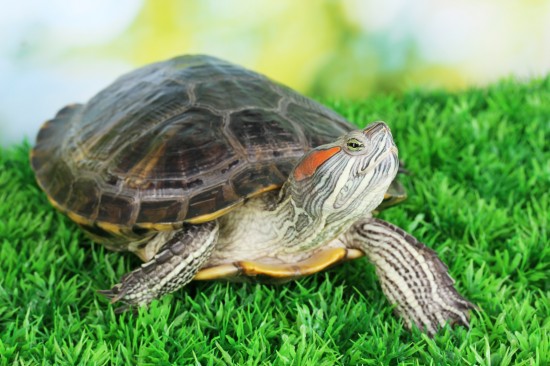

Turtles and terrapins of all types require very clean water that is maintained within strict parameters in order to thrive and remain in good health, and despite their popularity as pets with a wide range of people, turtles are delicate and exotic creatures that require a thorough understanding of their care and health. Kept in unsanitary conditions, handled unsuitably or given the wrong sorts of food, turtles of all species will soon become sick or fail to thrive, something every responsible owner will of course be keen to avoid.
Whether you already own a turtle or are simply at the research stage of thinking about getting one, it is a very good idea to learn about health and disease in turtles, plus some of the most common mistakes to avoid and problems to look out for.
Read on to learn more about health and illness in pet turtles.
In domestically pet turtles, over 85% of all illnesses and diseases are caused by either a poor diet or inadequate care, meaning that most of the common health issues that turtles can be affected by are actually totally preventable!
Poor temperature control or too much temperature variance, dirty water, or general neglect and poor care result in lots of turtle deaths each year, and poor diet for many more. In their natural habitat and if well cared for within the home, turtles can live for thirty years or more, so if the average lifespan of your turtles is just a few years, the chances are that something is wrong!
Just as with any other animal, turtles can get sick or injured sometimes, which necessitates a trip to the vet to resolve. While all UK practices can provide basic veterinary care for turtles, complex, serious or unusual conditions may require the services of a specialist exotics vet, which can be hard to find as well as expensive, and makes keeping your turtle healthy in the first place all the more important!
While advice given over the internet cannot ever replace the services of a trained and qualified vet and should not be taken in its place, this guide is intended to provide you with a short outline of some of the most common turtle and terrapin health conditions, and how to identify them.
Sick turtles need to be kept nice and warm, with the ideal temperature being between 27 and 30 degrees Celsius, as this temperature range are the parameters within which the immune system of the turtle are best supported. Hydration and maintaining good hydration in a sick turtle is also vital, and much more important than whether or not your turtle accepts or rejects solid foods. If turtles get dehydrated, it can be very hard to re-hydrate them adequately, which also puts them at risk of the added complication of renal failure.
If you keep multiple turtles together and know or suspect that one is becoming ill, isolate them from the other animals immediately to minimise the risk of cross infection. Ensure that you keep your own hygiene protocols spot on too, to avoid cross-infection between animals.
Bacterial infections may cause a white discharge from the eyes, which may also be puffy or swollen, and accompanied by sore skin. Bacterial infections are caused by inadequate filtration or dirty water, and require treatment with topical antibiotics and for the filtration or water quality issue to be resolved.
Bacterial infections that affect the mouth usually present with lesions around the mouth, or a built up of foul-smelling furry debris around the mouth. This may or may not accompany swollen eyes, and will generally also lead to a refusal to eat.
Bacterial infections of all types are highly contagious between turtles, and will require quarantining of the affected pets.
In order to treat a bacterial infection of the mouth, you must act promptly to get veterinary advice. The mouth will require cleaning with an iodine solution several times per day, as well as the removal of any rotten tissue. Depending on the source of the infection, topical antibiotics may also be administered.
Any breathing difficulties or infections of the lungs of the turtle should be treated as serious and urgent, and require immediate veterinary attention. Look out for front or hind leg weakness, nasal or oral discharge, and the head held in an unusual position to try to relieve pained breathing.
Antibiotic injections and nursing care are usually required to treat the problem.
Blood poisoning in the turtle may be caused by an injury that permits dirty water to enter a wound, leading to septicaemia, weakness, lethargy, and a possible flushed appearance of the limbs.
Urgent inpatient care is needed, which may require the services of a specialist exotics vet.
A calcium deficiency can lead to multiple problems with maintaining a natural, healthy hard shell in the turtle, which can also cause general weakness, ill health and trouble feeding normally.
This condition occurs due to either a lack of calcium fed within the diet, or a lack of available UVB light provision to permit your turtle to turn their calcium into essential nutrients.
Changing the diet to one that is calcium rich and providing UVB lighting can correct the issue if caught early on, but more serious or protracted cases may potentially prove fatal.
Copyright © 2005-2016 Pet Information All Rights Reserved
Contact us: www162date@outlook.com